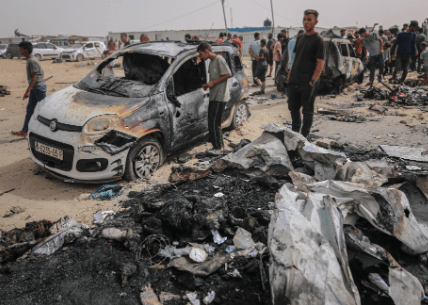
The White House has clarified that Israel’s recent military actions in Rafah do not constitute a “major ground operation” that would breach President Joe Biden’s warnings. This announcement comes as Israeli forces intensified their presence in Rafah following an airstrike that ignited a devastating fire, resulting in numerous Palestinian casualties.
Israel’s Military Movements and U.S. Response
Israeli tanks were observed entering central Rafah for the first time, amid increasing global criticism over civilian deaths in a densely populated tent camp. Additionally, U.S. aid deliveries to Gaza by sea were halted due to damage to a temporary pier. Despite these developments, National Security Council spokesman John Kirby assured reporters that the Biden administration does not consider Israel’s actions a violation of Biden’s “red line.” Kirby emphasized that the current maneuvers did not constitute a coordinated, large-scale ground invasion.
Defining a ‘Major Ground Operation’
Kirby explained that a “major ground operation” would involve thousands of troops moving strategically across various targets, which has not been observed in Rafah. A U.S. official echoed this sentiment, describing the deadly airstrike as a tragic incident rather than a deliberate ground invasion.
President Biden had previously stated that he would halt weapon shipments if Israel launched a significant ground offensive in Rafah. However, he clarified that the current operations did not meet this threshold. Kirby noted that Israeli officials have indicated their tanks are operating along the Philadelphi Corridor, a strategic border area, rather than within Rafah itself.
Tragic Tornado in Texas Claims Seven Lives, Including Children
International and Domestic Reactions
The airstrike in Rafah’s Tal al-Sultan neighborhood, which killed at least 45 people, has intensified international pressure on both the U.S. and Israel. Hala Rharrit, a former U.S. diplomat who resigned over U.S. policy on Gaza, criticized the administration for downplaying the severity of the situation. She argued that the distinction between ground and air operations is irrelevant when civilian casualties are mounting.
The United Nations’ top court has ordered Israel to cease its offensive in Rafah, and the U.N. Security Council is considering a resolution demanding an immediate ceasefire. Meanwhile, Israel has proposed a new ceasefire plan to mediators from Qatar, Egypt, and the U.S., aiming for a “sustainable calm” rather than a complete end to hostilities.
Investigations and Ongoing Conflict
Israel Defense Forces spokesman Rear Adm. Daniel Hagari stated that investigations are ongoing into the Rafah airstrike. He mentioned that the IDF targeted senior Hamas militants with two 17-kilogram warheads, but the resulting fire was unintended. Preliminary assessments suggest that stored weapons or a fuel tank might have ignited the blaze.
The images of destruction have increased pressure on the U.S. to reevaluate its stance. Kirby defended the administration’s position, expressing a desire to avoid further civilian casualties. The conflict, which began after Hamas’ attacks on October 7, has led to significant loss of life on both sides.
Rafah Future Outlook
National security adviser Tzachi Hanegbi indicated that Israel anticipates continued fighting for several more months to achieve its objectives of dismantling Hamas’ capabilities. This prolonged conflict mirrors former President Barack Obama’s “red line” policy regarding chemical weapons in Syria.
The situation in Rafah remains tense as international actors continue to push for a resolution while grappling with the humanitarian crisis unfolding in Gaza.




